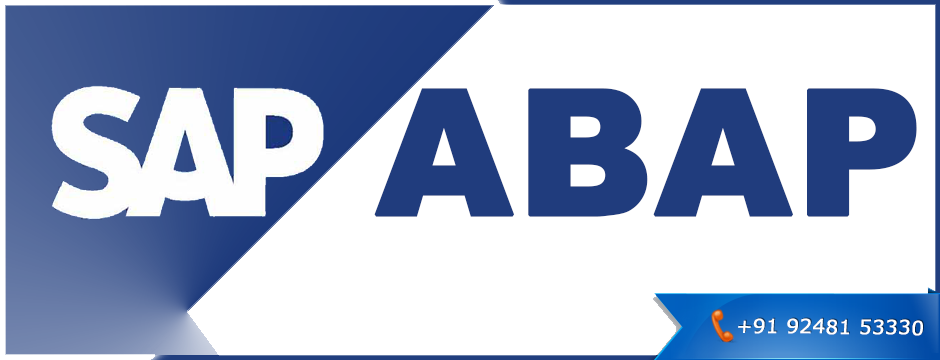
ONLINE SAP ABAP TRAINING COURSE
Apply For CourseDURATION : 45 DAYS
FACULTY : Mr. SAI KUMAR SATYA(10+Years exp)
- INTRODUCTION TO SAP AND ABAP/4 LANGUAGE
- Overall introduction to ERP
- Introduction SAP R/3 architecture, Introduction to SAP ABAP/4
- ABAP/4 editor (Focus on the functionalities of new ABAP editor)
- Data types
- Output statements
- Writing small programs
- Arithmetic operations
- String operations
- Control statements
- Parameters
- Open SQL –statements {insert, modify, delete, update}.
- Simple reporting
- Selection screens
- Transaction code creation
- Data Dictionary
- Tables
- Data element
- Domain
- Structures
- Search helps
- Views
- Type Groups
- Table maintenance generator and T-code creation
- Primary and foreign keys.
- Check and value tables.
REPORTING
- Debugging techniques
- Breakpoint creation.
- Watch point creation.
- Emphasize on the usage of New Debugger.
- Modes of Debugging.
- System Debugging.
- Update Debugging.
- Background Debugging.
- Debugging Background Jobs.
- Internal tables
- Declaration
- Type Casting
- Processing.
- Population.
- Control Break Statements.
- Modularization techniques.
- Includes.
- Subroutines.
- Function modules.
- Macros
- Variants.
- Conversion exits.
- For all entries and joins {inner and left outer}.
- Message class creation & message types and handling messages.
- Events for classical reports.
- Events for interactive reports.
- Hide and hotspot.
- Creating and handling buttons.
- Menu painter.
ABAP OOPS
- Fundamentals of OOPS.
- Introduction to Local classes and methods
- Importance of Public, Private and Protected sections.
- Simple reporting using local classes and methods.
- Global classes and interfaces.
- Usage of global classes in the reports.
- Class Based Exception Handling Mechanism - Exception Classes.
- Introduction.
- Types of ALV
- Simple report to display simple ALV List using Function Modules
- Simple report to display simple ALV grid using Function Modules.
- Interactive ALV Reports.
- Working with OOALV using classes (List, Grid).
DIALOG PROGRAMMING
- Introduction to screen painter and dialog programming.
- Flow logic
- PAI.
- PBO.
- POV.
- POH.
- Screen designing.
- Programming in object browser.
- Field validations.
- Creation of
- Table Controls.
- Tab Strips.
- Dynamic Screen.
- Call Screen.
- Set Screen.
- Leave to Screen.
- Leave Screen.
- Processing of list from transaction and vice versa.
- Screen table and its fields.
- Lock objects.
INTERFACE PROGRAMMING
- Why Data Transfers
- Introduction to BDC.
- File Handling.
- Presentation server.
- Application server.
- Recordings.
- Methods in BDC.
- Call transaction.
- Session method.
- Error Handling in Call Transaction.
- Legacy System Migration Workbench (LSMW)
- Different methods.
- Steps to Create an LSMW Project.
- Flat file creation.
- Uploading data.
SAP Scripts
-
-
- Introduction.
- Layout Sets.
- SAP Script Elements.
- Modifying standard layout sets (by using subroutines).
- Including logo.
- SAP script Control Commands.
- SAP Scripts Operations using different standard RSTX* Programs.
- Multi Language Handling in SAP Scripts.
SMARTFORMS
- Working with smart forms.
- Standard Texts.
- Graphics management.
- Writing print program and designing layouts.
- Output type configuration to standard orders.
FUNCTION MODULES
- Concepts of Function Group.
- Different Types FMs.
- Concepts of FM interface.
- Concepts of Update Programs.
IDOCS
- Concepts of IDOCS.
- Structure of IDOCS and Types.
- Creation of segments
- Creation of IDOCS.
- Using standard message types
ALE
- Defining logical systems used for ALE interfaces.
- Outbound / Inbound processing.
- Transferring of master data from one system to another system.
- Distribution modal view.
- IDOC Programming / Custom IDOCS.
BAPI and Business Objects
- Introduction to BAPI
- Overview of Business Objects.
- Step By Step Approach followed to create BAPI.
ENHANCEMENTS
- Introduction to enhancements.
- Different Ways of doing Enhancements.
- User Exits.
- Introduction to BADI
- How to implement BADI
- Enhancement Framework
- Explicit Enhancement
- Implicit Enhancement
- Overview on Enhancement Spots, Enhancement Section, Enhancement Implementations and Class Enhancements
SAP WORKFLOW
- Introduction of SAP WORKFLOW.
- Introduction of different elements of Workflow.
- Introduction to concepts of Binding.
- Introduction to Business Object Events
- Simple practical examples of SAP Workflow
-
COURSES OFFERING
- 3DS MAX
- 3DS MAX & V-RAY
- ADOBE PHOTOSHOP
- ADOBE AFTER EFFECTS
- ADOBE PREMIERE PRO
- ADVANCE EXCEL
- ADVANCED JAVA
- MULTIMEDIA ADVANCED
- angular
- AUTOCAD 2D / 3D
- AWS
- BOOTSTRAP 5
- C LANGUAGE
- C++ PROGRAMMING LANGUAGE
- CODEIGNITER
- CORE JAVA
- DATA SCIENCE
- DEVOPS
- DTP
- Graphic Designing (UX),
- HTML 4,5,6, CSS 2,3,4, JAVASCRIPT
- JQUERY AJAX JSON
- LINUX ADMINISTRATION
- LINUX UNIX SHELLSCRIPTING
- MEAN ( FULLSTACK UI TECHNOLOGIES )
- MERN ( FULLSTACK UI TECHNOLOGIES )
- MS-OFFICE
- MS-OFFICE & ADVANCE EXCEL
- MS-OFFICE & ADVANCE EXCEL & VBA
- MS-PROJECT
- MULTIMEDIA ADVANCED
- ORACLE ADF
- ORACLE SQL PLSQL
- PHOTOSHOP
- PHP
- PRIMAVERA P6
- POWER BI
- PYTHON
- PYTHON + DJANGO
- REACT JS
- REVIT
- RUBY
- RUBY ON RAILS
- SALESFORCE CRM ADMINISTRATION & DEVELOPMENT
- SELENIUM
- SKETCHUP
- SPOKEN ENGLISH
- STAAD PRO
- Tally.ERP9 (GST)
- UI TECHNOLOGIES
- UI TECHNOLOGIES + angular
- UI TECHNOLOGIES + REACT JS
- MEAN ( FULLSTACK UI TECHNOLOGIES )
- MERN ( FULLSTACK UI TECHNOLOGIES )
- WEB / UI DESIGNING
- WEB AND Graphic Designing (UX),

